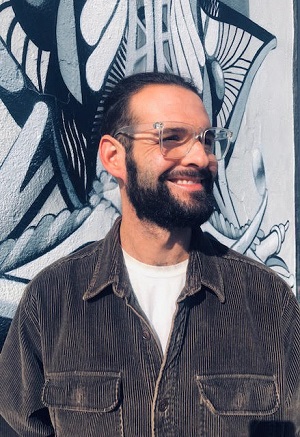
Breathing into the Divine
Contributor’s Marginalia: D.S. Waldman responding to Jessica Jacobs’s “Ordinary Immanence”
For a long time I’ve wanted, and time after time tried, to write a poem about God. A good poem. Something that does justice to the unspeakability, the total mystery of a greater power that cannot really be described so much has felt. Experienced. It should, I’ve thought, be easy. After all, isn’t poetry—that mode of writing that so often says without saying, shows instead of tells—the perfect medium for such an ambition?
I haven’t written that poem, though. Haven’t come close. But fortunately—fortunate for me, fortunate for the poetry community at large—we have Jessica Jacobs.
We have “Ordinary Imminence,” a poem that not only breathes divine air, brushing shoulders with the great mystery, but itself breathes air into the divine. It captures, in precise, unadorned verse, the very moment our speaker, looking up from a book amidst the morning rumble of garbage pickup day, is for the first time ready to welcome God—the infinite, the undefinable—into their life.
We begin with a recurring dream. A New York City apartment. A hidden door, never opened, which our speaker, in the dream, presses their ear against: “the cavernous echo,” then; rooms this speaker owned, but never before entered. This image alone, rich as it is with divine metaphor, might very well stand as a very successful poem—I feel the longing, the inaccessibility. It recalls a German word I’ve grown fond of recently, sehnsucht, which refers to a longing that cannot, by anyone or -thing, be fulfilled. An ache whose nature is to ache, not to be treated or quelled. There is something divine about this, though I’m still trying to make those ends lineup—is God just another word for unsatisfiable yearning?
Jacobs pushes past this image, this first potential end to the poem, and with long, syntactically-precise sentences broken over lines that end just, well, where they need to (there is something organic about the linebreaks, the indentations—in control but meandering, one foot on the left-margin, the other venturing, little by little, across the page, the form its own search for truth, for authenticity) we shift from New York City in the past to another “far / more spacious place,” landing in the moment of realization:
“Just like that—a new door / in a room I thought I knew by heart.”
Another reasonable place to end the poem, circling neatly back to the door, the room(s) from the recurring dream—I love when poems do this, when an image is used one way in the beginning and, later, reintroduced with new or evolved meaning. But as we’ve already seen in this poem, Jacobs isn’t one to settle for the “neat” or “easy” ending. Yet again, in the spirit of divine longing, she continues pushing towards something unexpected.
In this final section of the poem, my favorite part, Jacobs repurposes the earlier dream image—the speaker in their NYC apartment, ear to that unopened door—using it now strictly as metaphor:
“My hand is on the doorknob now, my ear / to the grain.”
Something has changed. We feel urgency in the shift to present tense. The sound they hear, now, isn’t on the other side of the door. No more far-off, cavernous echo. No, the sound is in the room, in the world around the speaker (“the deep breathing / of the daily world”) harkening back to that oft-cited bit of scripture, the kingdom of heaven is within you; it’s in every eye opening and lightbulb humming: a sound “you know so well / you’ve never heard it.” That ending. So. Good.
In a poem whose story, if it must be reduced to a single story, is the long–unfolding relationship between speaker and their God, what I love most is how the rhythm and movement of the poem—its desire, always, to push past the easy ending—relates so closely to the poem’s content, that lifelong pursuit of a more fully realized relationship with one’s God. There’s much to be said about this parallel, the similarities between the poetic impulse and spiritual longing. And I think rather than trying my feeble best to unpack that here, I’ll look to preorder Jacobs’s next book (forthcoming from Four Way Books in 2024), a section by section poetic exploration of Genesis. She’s our resident expert—and a marvelous poet.
 D.S. Waldman is a Marsh-Rebelo scholar at San Diego State University. His work has most recently appeared or is forthcoming in Georgia Review, Poetry Northwest, Gettysburg Review, Copper Nickel, and Colorado Review. He’s received fellowships, support and awards from Middlebury College, Kenyon Review summer workshops, San Diego State University, and Georgia Review.
D.S. Waldman is a Marsh-Rebelo scholar at San Diego State University. His work has most recently appeared or is forthcoming in Georgia Review, Poetry Northwest, Gettysburg Review, Copper Nickel, and Colorado Review. He’s received fellowships, support and awards from Middlebury College, Kenyon Review summer workshops, San Diego State University, and Georgia Review.